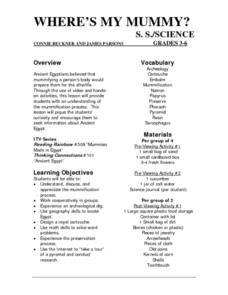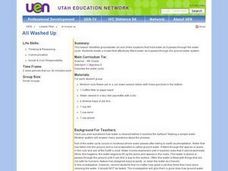Curated OER
Dirt Cups
After a hard day examining and dissecting worms, why not put your feet up and snack on a few? Here is a really cute idea that can be used to celebrate Earth Day or to accent a thematic learning experience. Kids use clay pots, gummy...
DiscoverE
Water Pollution Cleanup
How do scientists determine the best method for removing pollutants from our water sources? Environmental scholars experiment with pollution clean-up options to discover which are the most cost-effective, fastest, and most thorough....
Curated OER
It's Just Dirt
Learners discover how seed germination varies according to the soil type. In this soil science lesson, students discuss what plants need in order to grow and investigate various types of soil. Learners use their senses to describe each...
Marine Institute
Water Pollution
Sixth graders investigate the various types of pollutants found in water and ways to help prevent water pollution. Through a hands-on experiment, students create samples of polluted water by mixing water with vegetable oil, dirt, and...
Curated OER
Playing In The Dirt - Discovering Soil
Students discuss some the different types of soil in Oklahoma. They identify the soil types and explore the characteristics of each type of soil. In groups, students perform hands-on activities such as taking soil samples, classifying...
Curated OER
Separating Soil from Dirt
You can use these lesson ideas to teach students about the importance and ecology of soil.
US Environmental Protection Agency
Water Purification by Evaporation and Condensation
This easy-to-perform demonstration shows students how the water cycle, specifically the processes of condensation and evaporation, purifies Earth's water supply. Just mix up some water, dirt, and gravel in a glass bowl, place a cup in...
Curated OER
Agents of Erosion
Fourth graders observe and identify the effects of geological activities and weathering on Earth's surface. They also take a look at reports of events such as storms, earthquakes, floods, and volcanoes. There is a hefty hands-on activity...
Curated OER
Making a Comet in the Classroom
Students study comets and how Halley's comet was created. For this space lesson students create their own comets using dry ice.
Curated OER
Nature: Planting Terrariums
Students observe and experiment using a terrarium. In this scientific lesson plan, students build a nature terrarium. Students then observe their terrarium over a period of time to discover what makes the plants grow. A science...
Recycle OK
The Incredible Edible Landfill
Create an edible class model of a landfill using pudding, graham crackers, cookies, and licorice. After making the landfill model, the class discusses what each part represents and answers some other landfill-related questions. Then they...
Curated OER
Where's My Mummy: Preservation Techniques
To observe preservation techniques firsthand, learners dry a flower in sand and compare cucumber slices soaked in salt water for a week with slices left out to dry in the open air. Video resources (not attached) include one about mummies...
Curated OER
The Water Cycle and Sources of Pollution
Students make an island that has a construction site on it. They spill siulated pollution and trash on top of the island and then water it to simulate rain. They will observe how the rain washes dirt, sand, and pollution off the island...
Curated OER
Edible Soils
Students create soil profiles, including rock, clay, silt, sand, and humus, in clear plastic cups out of edible materials.
Curated OER
Causal Patterns in Ecosystems Section 3
Students design and create a worm and worm free compost tanks for observation of decay in ecosystems. They make predictions, care, and revist tanks using their journals for observation and data collection.
Curated OER
Agents of Erosion
Fourth graders explore the agents of erosion. They observe rocks that are rough and unweathered and record observations. They investigate rocks rubbed with sandpaper and ones that are not and the effects that the sandpaper has on the...
Curated OER
Animal Tracks
Learners study animals. In this science lesson plan, students make plaster casts of animals that live in the area. Learners identify the tracks.
Curated OER
Science: Where the Worms Live
Students build mine-earthworm habitats to discover their niche in them. They make predictions about what the niche looks like in a week and draw a picture of it. Students notice the tunnels in the soil and how the sand and dirt are now...
Curated OER
Hold on Tight!
Students explore the close connection between plant roots and the soil in which they grow. They investigate the roots of plants, make models of plant roots using pipe cleaners, and examine photos and images to explore the connection...
Curated OER
Data Sampling
Students discover data sampling. In this science lesson plan, students explore data sampling and turn the data collected into useful information by making graphs and using them to solve problems.
Curated OER
Chemical Reactions With Vinegar
Second graders observe chemical reactions. In this scientific inquiry lesson plan, 2nd graders determine whether vinegar creates a chemical reaction by observing two different experiments. A list of 7 supplies is included. In addition,...
Curated OER
All Washed Up
Fourth graders simulate filtration of water containing contaminates to determine how nature cleans water. They make predictions, report observations, and construct reasonable explanations concerning their outcomes. then connect this to...
Safe Drinking Water Foundation
Demonstration of Water Pollution
In this teacher-led demonstration, your young environmentalists will observe and record how different types of water pollutants look when they are combined. From here, individuals will develop a hypothesis on how the water can be...
Foundation for Water & Energy Education
What is the Water Cycle? Activity B
Curious physical scientists follow a lesson plan on the properties of water with this lesson plan on distillation. They observe a miniature water cycle model that filters dirty water into clean water. These two lessons combined are an...

























